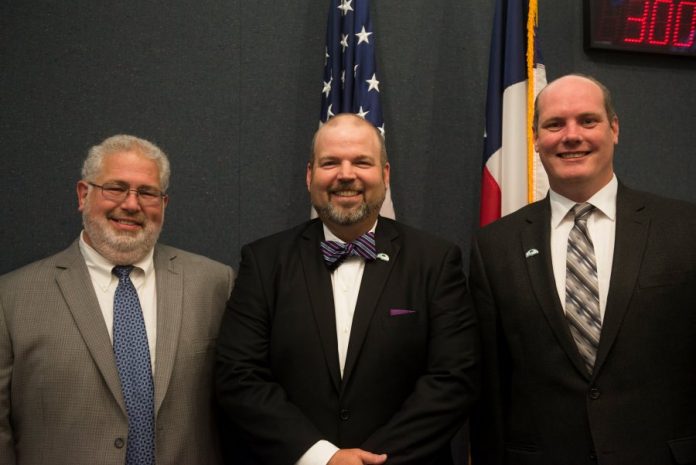
In the first Town Council meeting following the May 6 election, Town Secretary Theresa Scott presented the ordinance canvassing and declaring the results of that election. Sworn in were re-elected two-year term Place 1 Jason Webb and Place 3 Kevin Bryant, as well as new three-year term Place 5 Claudio Forest. See more photos here.
Following deliberation, chosen as mayor pro tem was Don McDaniel and Kevin Bryant will serve as deputy mayor pro tem.
In their first major decision, Flower Mound’s council members unanimously voted to transition management of the town’s crossing guard program from the Flower Mound Police Department (FMPD) to All City Management Services (ACMS), as of the 2017-18 academic year. There are currently 51 guards, some of whom double for elementary and upper-grade shifts, for 78 positions.
Prior to that decision, the two-hour discussion included input from: Pat Pohl, vice president of ACMS Operations; Flower Mound Police Chief Andy Kancel; FMPD Captain Wes Griffin, who is responsible for the Special Services Division, which oversees the Crossing Program; and, current crossing guards Kim Katz and Barbara Hill.
After listening to that discussion, council member Bryan Webb confessed that he brought the idea of possibly outsourcing crossing guards to Town Manager Jimmy Stathatos about two years ago, after seeing a police officer manning a crossing guard position.
“That’s poor management of a resource,” said Webb. “For me, it’s [changing guard management] never been about ‘cost savings.’ It’s been about using our resources in the most appropriate fashion.”
He pointed to eight-month statistics, from September 2016 to this April, citing that the FMPD had more than 27,000 total calls-for-service, including 911 calls.
During the hours of 7 to 10 a.m., 3,700 calls (14-percent) were received; and, from 2 to 5 p.m. another 5,300 calls-for-service came in (19-percent). FMPD actively responded to 33-percent of those calls, with 25-percent occurring during the crossing guard shift hours.
“Making sure that it [the crossing guard program] doesn’t negatively impact the town’s other critical functions and making sure that our first-responders are available to respond when called upon is critical,” he said. “The impact is decreased response times.”
“If police officers are serving as a guard, they must stay in that position,” Griffin has said. “If there were an accident in that crossing, or a need for service nearby, they can’t leave to take care of it.”
During the April 17 council meeting, the focus was all about financial impact, with budget numbers under the FMPD spotlighted; not so on Monday night.
The common focus was for the safety of both the school children and the residents of the town.
Webb added that it’s okay with him if this [using ACMS] costs the town more money, because it will enhance the safety for everyone in the town [by having on-duty officers available to respond to 911 calls, rather than serving as a crossing guard].
Council members were surprised to learn that the guards’ fear of losing their jobs– if ACMS takes over as management for the program– is a false concern. Under the current FMPD management, the guards’ positions end on June 1; and, each guard is required to apply– and re-qualify– again for a position at the beginning of each academic school year.
Some guards had written on social media that if their long-time supervisor, Kathy Linley (as an FMPD staff member), was removed, then they would resign. A position under ACMS would not have a similar rate-of-pay.
Al Linley (her husband and a P&Z commissioner) said that her 30-year service wasn’t being considered and that three alternative FMPD positions weren’t available yet, or were for a lesser salary.
Kancel explained that: “Kathy was in the [information] loop and, should this contract happen, I talked with her about a couple of options. One was as my administrative assistant position and she said, ‘no.’ Then, I presented a second and she said, ‘no.’ Then, in a records position, which she shadowed, but it would be ‘topped-out’ at a lower salary. Also, none of them involved children.”
He added that he’s been looking at the crossing guard issue for about a year, but waited until it was being looked at on the [council] agenda.
“We waited until after that [short] Friday [before the council meeting] to hold a meeting with the guards at Kathy’s request,” he stated.
That bad timing– an early-release on Good Friday and no school on Easter Monday, before the meeting that evening– meant for a very nervous and emotional weekend spent by the crossing guards, with hurt feelings and an unintended perceived lack of respect.
Following the April 17 council meeting, there were two crossing guard meetings– the April 28 meeting included Pohl to address guard concerns.
Two of the main sticking points for the guards– the lack of a specific job offer and whether a guard will retain a specific crossing location– are addressed on the www.acmssafety.com website under “Frequently Asked Questions:
Will our current Crossing Guards keep their jobs?
Yes, our goal is to maintain the jobs and site assignments for all current and qualified Crossing Guards.
Do you bring in guards from other areas?
No, we typically recruit and hire from the local community.
Additional concerns for the guards were voiced by Katz, who said she didn’t want to see “our town get outsourced.”
Her location crosses special needs and handicapped students– autistic, blind and hearing-impaired– as well as those who don’t speak English.
“These kids need someone to use sign language, speak different languages, have skills for autism and learning disabilities and the blind,” said Katz. “Plus, you also need to have someone who can communicate with their families. Will this company be able to provide that service?”
It was stated that the guards are not being outsourced; just the administration duties. Town Manager Jimmy Stathatos said that other town areas being outsourced include legal, architectural, median maintenance and other areas the town can’t afford to fund with staff.
“Everyone has a job at the same location as before tonight,” Mayor Tom Hayden said. “But, if someone feels they’re being outsourced, then you’re outsourcing yourself.”
Other concerns were voiced by Hill. One was the requirement of a guard having previous experience with children and the other was related to guards being able to use their vehicles to shelter nearby from heat or adverse weather. Not every crossing has a legal parking space to use for the guard. Kancel said that issue will be looked at to find a solution.
McDaniel said it bothered him that people don’t give credit to Kancel and the FMPD that they did a full investigation of all the many impacts, before reaching the decision to outsource management of the program.
Council member Jason Webb said: “We can’t fill the unknown with fear; we need to fill it with the truth.”
Pohl referred to ACMS’s 30-year reputation and its more than 4,000 guards nationwide when answering council questions.
“Happy crossing guards are good crossing guards,” she said. “I don’t want 51 people to lose their jobs. I stood in front of the groups and verbally offered them employment to continue in the job they do now. Everyone has been assured of a position. They asked if they would have their same location and I asked them: ‘do you like your position? Yes?’ Then, why would I change that?”
She said her only challenge is to ask the dedicated crossing guards to give her a chance. She said if they don’t like her after 30-days, they can throw her out; but, that’s never happened in 30-years.
She also was firm about a contract with ACMS not meaning a sacrifice in safety to the kids.
“I wouldn’t be in business if there was any element of depreciation in the safety of the people who use these crosswalks– children and adults alike– every day. We set the highest standard,” she said. “It’s not widgets; it’s people.”
















